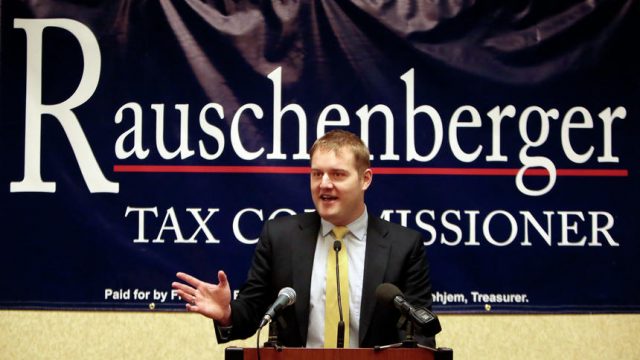Podcast: ND Tax Commissioner Says Trump Tax Plan Could Impact State Revenues

North Dakota Tax Commissioner Ryan Rauschenberger announces his campaign for the Republican Party’s nomination for North Dakota Tax Commissioner office on Wednesday, Feb.5, 2014, at the Fargo Holiday Inn. David Samson / The Forum
North Dakota Tax Commissioner Ryan Rauschenberger says he generally likes what he’s hearing so far when it comes to the tax reforms President Donald Trump is pursuing.
“I’m supporting the effort maybe even more so than a lot of the legislation,” he told me during an interview on my radio show yesterday (info on live stream and podcast here).
He said that the tax code is complicated policy, but he’s not going to let perfect reform be the enemy of good reform.
“I haven’t seen a perfect piece of tax legislation in all my experience,” he said.
[mks_pullquote align=”right” width=”300″ size=”24″ bg_color=”#ffffff” txt_color=”#000000″]”I haven’t seen a perfect piece of tax legislation in all my experience,” he said.[/mks_pullquote]
Rauschenberger said American interests have “trillions of dollars” sitting outside of the country which could be used in pursuit of investment and prosperity within our borders. “This allows it to come back home at a lower rate,” he said.
“We’re in a world wide economy,” he added. “Borders don’t mean what they used to mean.”
Still, he warned that changing the federal tax code could have implications for state income tax revenues at a time when our budget doesn’t have a lot of revenue to spare.
“We’re federalized,” Rauschenberger said of the state’s income tax code. Which means the state generally uses “the federal definition of income and what’s declared as income.”
“So many of our citizens take the standard deduction,” Rauschenberger added. If policy impacting income and deductions changes, it could impact state revenues. “It’s something we’re looking at,” he said.
Rauschenberger also warned that citizens shouldn’t expect reform to happen quickly. “Right now our tax code is based on the 1986 Tax Reform Act,” he said. “That passed in 1984. This stuff doesn’t just happen overnight.”
Here’s the full audio of yesterday’s show. Here’s info on how to listen to the show live from 12-2pm every day, or subscribe to the podcast.
[fcc_jw_podcast key=”5gIr1Rhu”]




